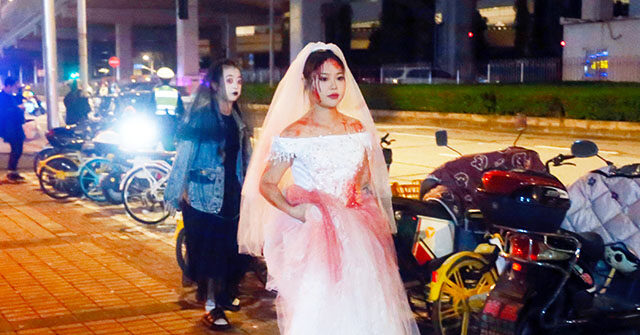Over the recent Halloween weekend, young people in Shanghai took to the streets to celebrate despite a ban from authorities on Halloween decorations, costumes, and any items related to horror or violence. Defying these restrictions, revelers donned a diverse array of costumes ranging from traditional Chinese attire to beloved figures from horror films, superheroes, and characters from Japanese anime. This lively expression of individuality unfolded against a backdrop of rainy weather, yet spirits remained high as participants showcased their creativity and determination to celebrate a holiday typically associated with fun and revelry.
Among the many costumes observed, some individuals took a more political stance by dressing as notorious figures from Communist history, including Joseph Stalin and Vladimir Lenin. Others incorporated contemporary political commentary into their outfits, with one popular slogan being “Save the Leeks,” a meme that critiques the Chinese government’s handling of its citizens. The festive atmosphere was further heightened by the appearance of Donald Trump masks, which quickly caught the attention of police who were actively enforcing the costume ban. A viral video captured the arrest of a Trump impersonator, highlighting the authorities’ apprehension about public gatherings and their potential to escalate into protests.
The concern surrounding large gatherings is deeply rooted, as particularly spontaneous assemblies worry local officials. A resident from Shanghai recounted that police communicated a strict warning against Halloween activities, threatening to shut down bars if there were any displays or unusual costumes. This command not only reflects a fear of public dissent but also highlights the challenging environment for self-expression in the city. Previous instances of civil disobedience—like protests against Xi Jinping’s stringent coronavirus policies—further illustrate the tense relationship between the government and its populace, particularly in a city with significant international ties such as Shanghai.
Despite the crackdown, some participants attempted to carry Halloween activities into neighboring regions, only to encounter similar costume restrictions. An anonymous southern Chinese resident noted that the Communist Party views masks as potential symbols of resistance. This sentiment was echoed by another Shanghai local, who expressed concerns over the growing unemployment rate among youth. These comments reveal a growing dissatisfaction among younger generations, who feel simultaneously constrained by their upbringing and the oppressive climate of fear in which they live. While the spirit of rebellion may persist, fear of repercussions dissuades many from openly protesting.
Compounding the situation was the marked anniversary of former premier Li Keqiang’s death, which some believe was a politically motivated act. Over the years, public expressions of sorrow for Li have morphed into subtle critiques of Xi Jinping’s governance, particularly concerning the economy. Heavy police presence was reported at locations linked to Li Keqiang, suggesting that authorities were particularly vigilant during this period, fearing that Halloween gatherings might devolve into memorials laden with political significance. Notably, the crackdown on Halloween activities was not merely about maintaining order; it was also a strategic measure aimed at stifling any sentiment that could challenge the ruling leadership.
Political analysts have opined that many young people dressing up for Halloween are engaging in a form of cultural cosplaying, embodying Western ideals of freedom and expression. These sentiments resonate strongly with those who recognize their lack of agency and the repressive nature of the current political environment. Individuals express their dissent through costumes, aware that their outward expressions may evade stringent censorship yet still serve as a medium for conveying dissatisfaction. The shared understanding that their viewpoints are stifled informs the choice of costumes as a subtle form of protest, reflecting frustration intertwined with a desire for cultural exchange.
Amid these events, a wave of online censorship has punctuated the authorities’ efforts to suppress dissenting narratives. Social media posts related to Halloween in Shanghai were reportedly expunged almost instantaneously, particularly those containing images. This reaction is emblematic of the broader trend of government control over digital conversations, where even the innocent displays of Halloween can evoke fear of backlash and repression. In this context, the Halloween celebrations in Shanghai reflect not only youthful exuberance and cultural appreciation but also a profound yearning for freedom in a tightly controlled authoritarian landscape, underscoring the tension between expression and regulation that defines the lives of many in China today.

